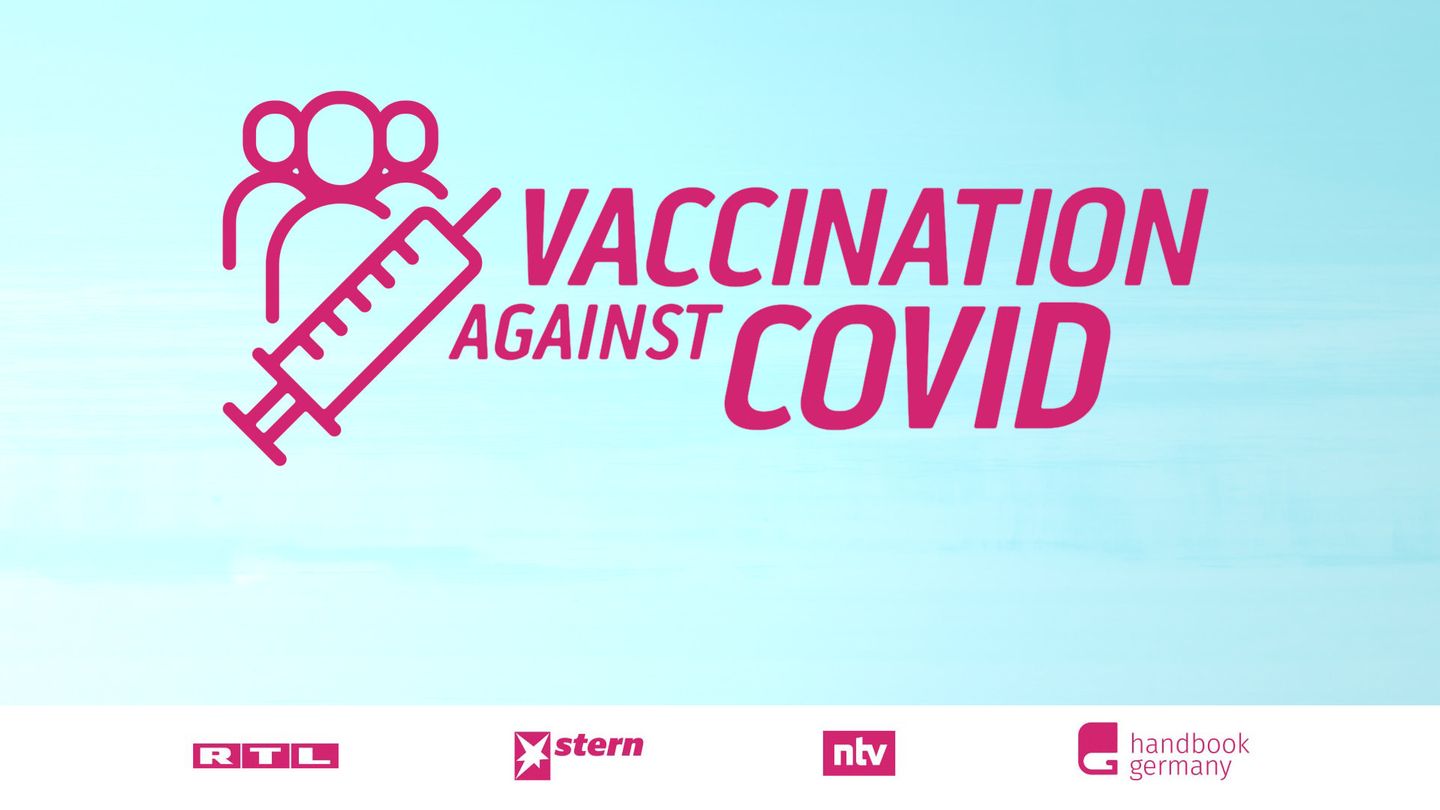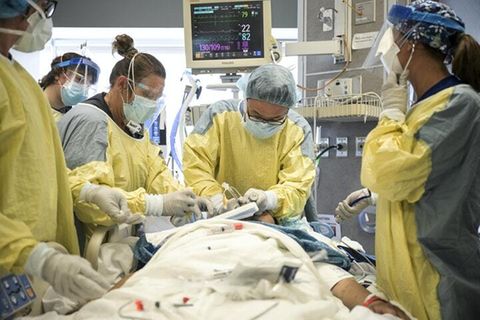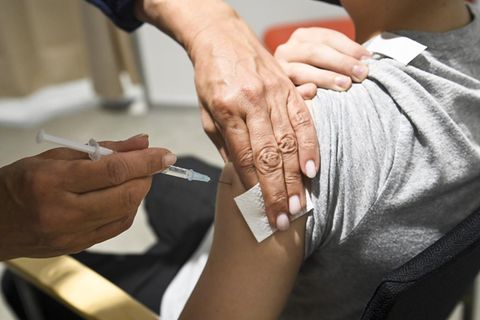For more than a year now, the whole world has been suffering in the face of the coronavirus pandemic. Over three million people who had Covid-19 have died. But there is hope: Since late last year, vaccines against the virus have been developed. Germany's vaccination campaign has recently picked up speed considerably. There is hope that enough people will be vaccinated by the end of this year to prevent further large infection waves.
Yet, some people remain sceptical of the vaccines partially because of rare cases of severe side effects associated with the AstraZeneca vaccine. In addition, there are numerous myths about the Covid vaccination that can cause confusion. How much truth is in these myths? Here's an overview.
Myth: Covid vaccines do not provide sufficient protection – people can still get ill
Fact: The protective effect of the Covid vaccines is quite good – the Biontech/Pfizer and Moderna vaccines, for example, provide 95 per cent protection against Covid-19. However, the Robert Koch Institute (RKI) points out that it is still possible to get infected because 100-per cent protection is simply not feasible.
For example, if a vaccinated person gets infected shortly before receiving the vaccine, they can get ill. It is also possible for someone to contract Sars-CoV-2 shortly after vaccination, i.e., before full vaccine protection is achieved. This is because, as a rule, the vaccine reaches its protective effect gradually, 10 to 14 days following the injection of the first vaccine dose.
Myth: Vaccination will be compulsory
Fact: Vaccination against Covid-19 is currently not compulsory in Germany. However, under the Infektionsschutzgesetz (German Infection Protection Act), protective vaccinations can be ordered by the Federal Ministry of Health with the approval of the Bundesrat. This is the case when "an infectious disease with severe clinical forms of progression occurs, and its epidemic spread is expected" (section 20, subsection 6 of the Infektionsschutzgesetz). Covid-19 would fulfil both of these criteria. However, the Federal government has declared itself against mandatory vaccination. Nonetheless, the state strongly recommends vaccination because a Covid-19 vaccination protects the vaccinated individual as well as the community.
Myth: Covid-19 vaccination impairs women’s fertility
Fact: There is no scientific evidence that a Covid-19 vaccine can impair women's fertility. Researchers suspect that this myth is based on a minimal similarity between the spike protein (the protein which protrudes from the virus shell in the form of spikes and serves the virus to attack human cells) and a protein contained in the human placenta. However, only 5 out of more than 500 amino acids occur in a similar – but not identical – form in the spike protein. In addition, these amino acids are concealed within the placenta protein and could therefore not be reached by external antibodies.
This alone shows that the myth is hardly plausible. Furthermore, experts emphasise: If the vaccination alone were to cause infertility, a Covid-19 infection would do so even more because the number of spike proteins in the body is much higher during an infection. So far, such a case has not been observed across the world.
This is how the Paul-Ehrlich Institute assesses the issue: "Based on the available data, the approval criteria of pharmaceuticals guarantee the best-possible certainty for excluding damage to reproductive organs and reproductive impairment in humans." This means that women wishing to have children can be vaccinated against Covid-19, as the RKI confirms.
Myth: mRNA vaccines modify the human genome
Fact: mRNA vaccines contain a snippet of viral DNA, which results in a kind of 'construction command' to the body cells of vaccinated individuals. The matching messenger RNA (mRNA) instructs them to produce spike protein, to which the immune system can respond. This way, vaccinated individuals are protected against severe forms of the disease or death in the future.
However, mRNA vaccine does not come into contact with human DNA since DNA is located in the cell's nucleus, into which mRNA vaccine material does not enter. In addition, mRNA vaccines have a different chemical structure from DNA. So, it cannot be simply integrated into human DNA.
In a study published in late 2020 (but not yet reviewed by independent experts), researchers show in laboratory trials that small fragments of the RNA of Sars-CoV-2 may, under certain circumstances, be converted into DNA and incorporated into the human genome. However, it remains unclear whether this can also happen outside the laboratory. And even if it was possible in the course of a real-life infection with the virus, other researchers assume that this is quite a rare occurrence with no biological significance. In any case, this process is unlikely to be relevant for vaccination using mRNA vaccines.
Myth: Covid-19 vaccination can cause cancer
Fact: In the studies reviewing the Covid-19 vaccines, such a correlation was not found. Cancer can occur when cells divide in an uncontrolled manner. The reason for this is often damage to the genetic material, the DNA, or errors when reading genetic information. However, in Covid-19 vaccines AstraZeneca and Johnson & Johnson, which use adenoviruses as a means of transport (vector), the information about the spike protein is available in the form of DNA. Adenoviruses are non-integrating viruses whose DNA does not come into contact with the cell nucleus. However, there are indications of foreign DNA within cells being able to get into the human genome by chance and damage it in rare cases.
Nevertheless, scientists do not believe that this means that vaccination using vector vaccines can cause cancer. Because, for one thing, the vaccine is injected into the upper arm muscle – muscle cells divide very slowly, which makes cancer unlikely. For another thing, the immune system will usually kill genetically damaged cells after a few weeks. Last but not least, real-life infections with adenoviruses, such as common colds, have so far not been known to cause cancer as a late effect.
Myth: The development and approval of the Covid-19 vaccines took place too quickly
Fact: It is true that the Covid-19 vaccines were developed and approved at record speed. Such processes usually take 10 to 15 years. But the circumstances of the Covid pandemic enabled a more rapid development. For example, large amounts of money were invested globally into the research of vaccines. While the highly effective mRNA vaccines are the first of their kind ever approved, this technology has been researched for over 20 years.
Also, the approval procedures have been made more efficient to save time – some of the steps ran in parallel and were not, as is customary, following one another. Finally, researchers already had prior knowledge on potential vaccines for coronaviruses due to their experience with the Sars-CoV-2 precursors, SARS and MERS.
It is essential to mention that the authorities did not compromise the quality, effectiveness, and safety requirements despite the accelerated approval procedures. All vaccines administered in Germany have been carefully tested in clinical trials on a sufficient number of humans without serious complications. Such trials must confirm that the effect considerably outweighs the side effects that may occur.
Plus, before approval in Germany, the quality of every batch of the vaccine must be checked by the competent Paul-Ehrlich Institute or through an inspection carried out on their behalf. The respective vaccine dose is cleared for injection only if it is safe and effective.






